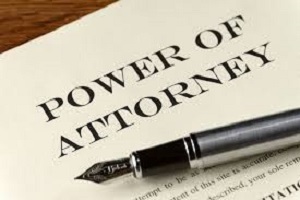
POWERS OF ATTORNEY
A Power of Attorney (POA) is a written instrument that is used to delegate authority to another. The person who signs (executes) a Power of Attorney is called the Principal. The one given legal authority to act is called an Agent. The agent can have broad authority or limited authority to make legal decisions about the principal's property and finances. There are several types of POAs.
General Powers of Attorney
This Power of Attorney document allows an agent to represent the principal in all property and financial matters as long as the principal’s mental state of mind is competent. If a situation occurs where the principal becomes incapable of making decisions for him or herself, the POA agreement would automatically end.
Durable Powers of Attorney
The Durable Power of Attorney remains in control of certain legal, property or financial matters specifically outlined in the agreement, even after the principal becomes mentally incapacitated.
Springing Powers of Attorney
This Power of Attorney becomes effective at a future time. That is, it "springs" upon the happenings of a specific event chosen by the Power of Attorney. Usually, that event is the illness or disability of the principal.
Important Facts
1. You can give your agent as much or as little power as you wish. You may want to give your agent authority to do some or all of the following:
• Use your assets to pay your everyday expenses of you or your family.
• Buy, sell, maintain, pay taxes on, and mortgage real estate and other property.
• Collect Social Security, Medicare, or other government benefits.
• Invest your money in stocks, bonds, and mutual funds.
• Conduct transactions with banks and other financial institutions.
• Buy and sell insurance policies and annuities for you.
• File and pay your taxes.
• Operate your small business.
• Claim property you inherit or are otherwise entitled to.
• Transfer property to a trust you've already created.
• Hire someone to represent you in court.
• Manage your retirement accounts.
• Enter your safety deposit boxes.
A few key powers cannot be delegated. These include the authority to: Make, amend or revoke a will.
2. A Power of Attorney can end for a number of reasons, such as when the principal dies, the principal revokes it, a court invalidates it, the principal divorces his/her spouse who happens to be the agent, or the agent can no longer carry out the outlined responsibilities.
• You revoke it. As long as you are mentally competent, you can revoke a durable Power of Attorney at any time.
• You get a divorce. In a few states, if your spouse is your agent and you divorce, your ex-spouse's authority is automatically terminated. In other states, if you want to end your ex-spouse's authority, you have to revoke your existing Power of Attorney. Either way, it's wise to make a new document as soon as you file for divorce.
• A court invalidates your document. It's rare, but a court may declare your document invalid if it concludes that you were not mentally competent when you signed it, or that you were the victim of fraud or undue influence.
• No agent is available. To avoid this problem, you should name an alternate agent in your document.
3. New York's Basic Requirements
According to the New York Consolidated Laws, General Obligations Law, Section 5-1501B, a POA must:
• Be typed or printed “using letters which are legible or of clear type no less than twelve point in size, or, if in writing, a reasonable equivalent thereof."
• Be signed and dated by the principal, when the principal has mental capacity.
• Be acknowledged by the principal before a notary public as required for a conveyance of real property.
• Be signed and dated by the agent before a notary public.

4. A Power of Attorney cannot grant an agent the authority to make medical decisions for the principal. In New York State, the proper legal instrument for delegating healthcare decisions to another is called a Health Care Proxy. A health care power of attorney allows your agent to make healthcare decisions on your behalf if you are unconscious, mentally incompetent or in any way unable to do so.
5. You do not need a lawyer to draft a Power of Attorney. However, it may be wise to consult one who can:
• Provide legal and other advice about the powers that are appropriate to be delegated.
• Provide counsel on the choice of an agent.
• Outline the agent's legal and fiduciary obligations while acting under a Power of Attorney.
• Ensure that the Power of Attorney is properly executed and meets all legal requirements.
6. When selecting a Power of Attorney, you should choose your agent with care to ensure your wishes are properly carried out to the greatest extent possible. It is critical to name a person who is both trustworthy and capable to serve as your agent. This person will act with the same legal authority you would have. An agent may have access to your bank accounts, the power to make gifts and transfer your funds, and the ability to sell your property.
Your agent can be any competent adult, including a professional such as an attorney, accountant or banker. But your agent may also be a family member such as a spouse, adult child or other relative. Naming a family member as your agent saves the fees a professional would charge, and may also keep information about your finances confidential.
Parents who create POAs very commonly choose adult children to serve as their agents. Compared to naming one’s spouse as agent, the relative youth of the child is an advantage when the purpose of the POA is to relieve an aging parent of the burden of managing the details of financial and investment affairs and/or provide management for an aging parent’s affairs should the parent become incapacitated. In these cases, a spouse named as agent who is near the same age as the person creating the POA may come to suffer the same debilities that led the POA’s creator to establish it, defeating its purpose.
When there is more than one child, parents may struggle with the decision of who to select for the role of agent. Children have different characters, skills and circumstances, and wise selection of children as agents, and of the powers given to them, can avert these dangers. However, you can have multiple POAs naming separate agents and customize them for each child’s skill set, temperament and ability to act on your behalf.
Consider these three key factors when choosing which child you want to give important powers to under a POA:
1. Trustworthiness: This is the single most important trait of any agent named under a POA. This includes not just honesty but also reliability in performing tasks that need regular attention, from managing an investment portfolio to paying bills, and diligence in acting according to your wishes.
2. Abilities of each child: Specific abilities of different children may make them best suited to take on particular roles in managing your financial affairs. You can use “limited” POAs to give different children defined and limited powers over different aspects of your finances. For example, imagine a situation where one child is a busy financial expert living in a distant city, while another works part time and lives conveniently close by. You can have one POA that names the first to manage your investment portfolio and another that names the second to manage your routine expenses and pay monthly bills.
3. Multiple agents: More than one agent can be named by a POA, either with authority to act separately or required to act jointly. Having two children separately authorized to manage routine items can be a convenience if one becomes unavailable for some reason, while requiring two to agree on major actions like selling a house can assure family agreement over major decisions.
 But naming multiple agents can cause problems if disputes arise between them. For instance, if two children are required to act jointly in managing an investment account but disagree over how to do so, it may be effectively stalemated. So when choosing two children to act jointly as agents under a POA, be sure they have not only the skills for the task but personalities to cooperate.
But naming multiple agents can cause problems if disputes arise between them. For instance, if two children are required to act jointly in managing an investment account but disagree over how to do so, it may be effectively stalemated. So when choosing two children to act jointly as agents under a POA, be sure they have not only the skills for the task but personalities to cooperate.
You must be convinced that the agent will follow your instructions, has the ability to do so and will pursue your wishes even over the objections of other family members if need be.
Never name a child to be your agent as a matter of “fairness,” to avoid hurt feelings or to preserve family harmony, if you lack trust. Beware naming a child as your agent if:
• You experience difficulty, awkwardness or resistance when explaining to the child the duties to be taken on as your agent under the POA.
• The child may not be available to perform the duties, or not be reliable in doing so due to his/her own concerns or distractions.
• The child has a history of problems with gambling or substance abuse.
• The child has serious debts and/or has been irresponsible in managing his/her own finances and affairs.
• The child is engaged in intra-family conflicts that may result is using the powers received under the POA to favor some family members over others.
Frequently Asked Questions
Do I Need Separate Documents for Medical Care and Finances?
Yes, it's required in New York. Moreover, making separate documents will keep life simpler for your agent and others.
For example, your health care documents are likely to contain personal details that your financial broker doesn't need to know. Likewise, your health care professionals don't need to be burdened with the details of your finances.
Even though you should make separate power of attorney documents for health care and finances, it may make sense to name the same person under both documents. If not, you must be sure to name people who will work well together.
Can I appoint more than one Agent in a Power of Attorney?
Yes. You may appoint multiple agents. If you appoint two or more agents, you must decide whether they must act together in making decisions involving your affairs, or whether each can act separately. There are advantages and disadvantages to both forms of appointment. Requiring your agents to act jointly can safeguard the soundness of their decisions. However, requiring agreement of all your agents can result in delay or inaction in the event of a disagreement among them, or the unavailability of one of them to sign legal documents. Allowing your agents to act separately may ensure that an agent is always available to act for you. But it may also result in confusion and disagreements if the agents do not communicate with one another, or if one of them believes that the other is not acting in your best interests.
You can also appoint an alternate or substitute agent. A substitute agent can act if the first agent is unable or unwilling to act for you. It is generally a good idea to appoint a substitute agent.
Once I sign a Power of Attorney, may I continue to make legal and financial decisions for myself?
Yes. The Agent named in a Power of Attorney is only your representative. As long as you have the legal capacity to make decisions, you can direct your agent to do only those things that you want done.
What are an Agent's obligations to a Principal?
The Agent is obligated to act in the best interests of the Principal, and to avoid any "self-dealing." Self-dealing is acting to further the selfish interests of the agent, rather than the best interest of the principal.
An agent appointed in a Power of Attorney is a fiduciary, with strict standards of honesty, loyalty and candor to the principal. An agent must safeguard the principal's property, and keep it separate from the agent's personal property. Money should be kept in a separate bank account for the benefit of the principal. Agents must also keep accurate financial records of their activities, and provide complete and periodic accountings for all money and property coming into their possession.
Make clear to your agent that you want accurate records of all transactions completed for you, and to give you periodic accountings. You can also direct your agent to provide an accounting to a third party--a member of your family or trusted friend--in the event you are unable to review the accounting yourself.
Who monitors the actions of my Agent?
There is no official or government monitoring of agents acting pursuant to Power of Attorney. That is the responsibility of the Principal. It is therefore important to insist that your agent keep accurate records of all transactions completed for you, and to provide you with periodic accountings. You might also direct your agent to give an accounting to a third party in the event you are unable to review the accounting yourself.
Should a principal, member of the principal's family or a friend have grounds to believe that an agent is misusing a Power of Attorney, the suspected abuse should be reported to a law enforcement authority to protect the principal from the loss of his or her property. Consider asking a lawyer for help and advice.
What can I do if my Agent does not follow my instructions?
You may revoke your Power of Attorney at any time.
You should inform your agent, in writing, that you are revoking the Power of Attorney. Request the return of all copies of your Power of Attorney.
You should notify your bank or other financial institution where your agent has used the Power of Attorney that it has been revoked.
You should file a copy of the revocation with the County Clerk if your Power of Attorney has been filed in the Clerk's office.
If you decide to revoke a Power of Attorney, it is probably best to arrange to have a new Power of Attorney executed.
Will my POA allow my Agent to act after my death?
Your durable power of attorney automatically ends at your death. That means that you can't give your agent authority to act after your death, such as paying your debts, making funeral or burial arrangements, or transferring your property to the people who inherit it. If you want your agent to have authority to wind up your affairs after your death, use a will to name that person as your executor.
Can my Agent be legally liable for decisions made on my behalf?
No. Your agent will be liable only for intentional misconduct, not for unknowingly making a misjudgement. This protection is included in power of attorney documents to encourage people to accept agent responsibilities.
Is my POA valid in another state?
It is effective if executed in compliance with laws of that state.
What should I do with my POA after it is signed?
You are not required to file a Power of Attorney in a government office, unless the Power of Attorney is used in a real estate transaction. Then, it must be filed in the County Clerk's office. And when you file in the County Clerk's office, the Power of Attorney is a public record open to inspection by the public. A writing that revokes a filed Power of Attorney should also be filed in the County Clerk's office. If you file a Power of Attorney in the County Clerk's office, you will be able to get additional "certified" copies from the County Clerk for a small fee. A certified copy is legally equivalent to the original document. It is often convenient to have certified copies of your Power of Attorney. Keep an original for yourself.
Give a duplicate original to your agent(s), your attorney and any other relevant parties.



